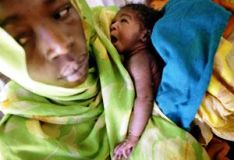Amnesty: Rapes in war zones not punished
By CATHERINE McALOON, Associated Press Writer
LONDON, Dec 8, 2004 (AP) — Women and girls in war zones suffer rape and violent abuse while offenders escape punishment, Amnesty International said a report released Wednesday.

|
|
Suad Abdalaziz, 28, who was raped and became pregnant during a attack by the Jajaweed in the village of Tawila, holds her 3-day-old baby girl. |
Because national authorities have failed to act to halt such abuses, the human rights group says such cases should be a priority for the new international criminal court.
“What we have seen consistently is that if you don’t prosecute and punish then, there is a tendency for it to continue,” said Amnesty’s secretary general, Irene Khan.
Despite promises, treaties and legal mechanisms, governments failed to protect women and girls in conflicts in Colombia, Iraq, Sudan, Chechnya, Nepal and Afghanistan, the report said.
While international laws recognized rape and sexual violence as war crimes, prosecutions were not being brought against offenders, Amnesty said.
“Women and girls are not just killed, they are raped, sexually attacked, mutilated and humiliated,” Khan said in an interview.
She said the scale and nature of the abuses, uncovered by researchers working in Amnesty International’s “Stop Violence Against Women” campaign, were “horrendous.”
“In the Democratic Republic of Congo, there are tens of thousands of cases of women who have been sexually tortured, raped, attacked, mutilated and killed,” Khan said.
“In Darfur (Sudan), we have taken testimony from hundreds of women.”
Khan said no official statistics were kept, so it was impossible to say whether the situation was worsening.
The report found violence against women was not just collateral damage of war, but a deliberate military strategy, with women targeted in ethnic cleansing offensives.
“By attacking the women, you are attacking the honor of your enemy, you demoralize the men, you scare people into running away very rapidly,” Khan said.
Women and girls were also disproportionately affected by cluster bombs and land mines, she said. “They are the ones that go out and collect food and water and are therefore the ones that get blown up.”
Government forces, militia, police, prison guards, private security personnel, military forces stationed abroad, United Nations and other peacekeeping forces, staff of humanitarian agencies, neighbors and relatives had all committed abuses against women, Amnesty International said.
The abuses occurred in refugee camps, at checkpoints and border crossings, in public places, private homes, prisons and detention centers.
In Iraq, female detainees told Amnesty International delegates they had been threatened with rape, beatings, humiliating treatment and long periods of solitary confinement while imprisoned by coalition forces.
U.S. Defense Department spokesman Lt. Col. John Skinner would not comment on the allegations specifically but said defense policy had always been to treat detainees humanely in accordance with the Geneva Conventions.
“When we receive any credible allegations of abuse or mistreatment we aggressively investigate those and take appropriate action,” Skinner said.
Khan said violent crimes against women continue because perpetrators knew they would go unpunished. In wartime, it was difficult for women to get justice through national systems because those same systems were often discriminatory or had collapsed because of the war, she said.
“That’s why we think international laws should address it,” she said.
Khan said it was vital that one of the first prosecutions brought by the International Criminal Court when it convenes in The Hague next year covers violent crimes against women.
“A strong global message must be sent that violence against women will be vigorously pursued,” Khan said.
The report urged political leaders to openly condemn violence against women and cooperate with the court in bringing offenders to justice. It also recommended the urgent provision of medical and humanitarian support for female survivors of abuse.
